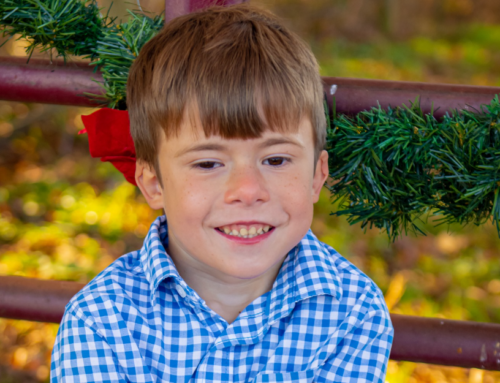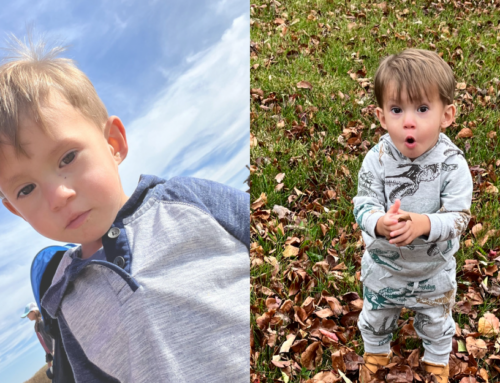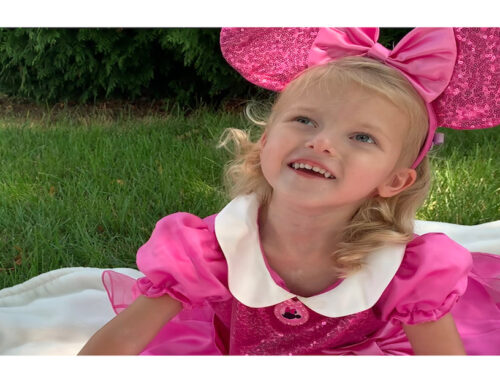I had a normal pregnancy with Amirah so I had all the usual hopes and dreams prior to delivery that my child would be happy and healthy. But, Amirah turned blue while eating the day after she was born sending her to the Neonatal Intensive Care Unit (NICU) at our local hospital for a few days. She was sent home from the NICU with a diagnosis of an elevated diaphragm (the muscle that separates the chest from the abdomen) and followed for one year thereafter. Life perked along and there were no concerns…until around 6 months when we noticed Amirah wasn’t using her left arm to play with toys or reach to play…and she was not yet sitting up on her own. At that point we took her to the Children’s Hospital of Philadelphia (CHOP) where she had an MRI that showed Amirah’s brain hadn’t developed correctly…something called polymicrogyria where the surface of the brain has too many folds that are unusually small. Amirah started Early Intervention (EI) for physical therapy. Amirah sat up on her own around 10 months and continued with EI for physical therapy, speech therapy and occupational therapy until she was 3 years old when she graduated to the local EI Head Start Preschool Program.
Amirah started seeing Dr. Robert Campbell, a famous orthopedic surgeon at CHOP (who sadly passed away this past July which is why we put his name on Saquon’s cleats), when she was around 2 or 3 years old, and we noticed her spine was curved. She got a brace to slow down the growth of her curve. The first 3 months went great and her spine hadn’t changed…another 3 months went by and it changed so much that Dr. Campbell suggested surgery.
At the same time, Amirah was having asthma-like symptoms, so we started seeing Pulmonary too. When she was 4, Amirah had her spine surgery which included rod placement, and then numerous expansions and revisions. Dr. Campbell was always so nice and made me feel at ease every time Amirah needed surgery. Amirah and I really loved him and when I heard of his passing I became really emotional…
Amirah’s local speech therapist felt her speech had reached a standstill despite intensive therapy. She wasn’t improving, so she suggested we have further testing. We went to see Dr. Ken Kazahaya at CHOP and he put a camera down Amirah’s nose and saw that she didn’t have the correct structures in her palate. He referred us to Genetics because he thought she had 22q11.2 deletion syndrome.
Amirah was seen by Dr. Elaine Zackai in Genetics in December and tested for the chromosome deletion. It was on January 5th that I received the call from Center Director, Prof. Donna McDonald-McGinn, that Amirah did have 22q. She was 5 years old. Since then, I have been followed in the 22q and You Center at CHOP, where they help me coordinate Amirah’s care. Amirah and I always have such a nice time when we visit the Center. The team is full of so much knowledge. We are so grateful for the 22q and You Center. We don’t have any doctors where we live that know about 22q, so going to a place that knows what Amirah is going through is great!
Amirah was also sent to Dr. Oksana Jackson to repair the difference in her palate. Amirah was was going to be starting kindergarten at a new school. The speech expert, Cindy Solot, recommended Amirah have extensive speech therapy to prepare her for the surgery. She started kindergarten and it was tough for me. I didn’t want other kids or her teachers to not be able to understand her. About a month into school, Amirah was ready and had her surgery. It was one of the best decisions we made. Her speech improved so much. She was able to communicate by herself and have conversations with her friends. Amirah still receives speech therapy at school and in speech clinic.
We always hoped to give back to the 22q community that has helped us so much, through the International 22q11.2 Foundation, Inc. The Foundation has been raising awareness, supporting early diagnosis, accessing the best possible clinical care and partnering with professionals who know about the condition. They are promoting continuing research working towards improved interventions, and they have helped to create an international community with other family organizations around the world. Their work includes campaigns for instituting newborn screening for 22q, so no child will need to wait until 5 years of age to have a diagnosis of 22q. However, most importantly, the Foundation helps families navigate this complex condition and better cope with the hurdles that come along.
The International 22q11.2 Foundation has been doing this for more than 15 years — through events like their signature event, 22q at the Zoo Worldwide Awareness Day, which brings families to a local Zoo, Aquarium or other location, on the same day in May — but since it is happening around the world, everyone feels connected. We love attending 22q at the Zoo at the Philadelphia Zoo because it is fun for Amirah, it is fun for us, and most importantly when we are there we don’t feel alone.
We are so very lucky to have Amirah in our lives and also to have her uncle committed to helping Amirah and other children with 22q deletion syndrome. When Saquon was in college we had a 5k for 22q, but he said when he makes it to the NFL and has a bigger platform he wants to bring even greater awareness to 22q. When he was picked to participate in the “My Cause My Cleats” initiative, he knew what he would pick. He wanted to help raise awareness for 22q so he designed his cleats with the International 22q11.2 Foundation’s logo on them. He also has a photo with him and Amirah on them. They have a very special bond and he will be wearing them on December 2nd when the Giants play the Chicago Bears in the Meadowlands.
If I could tell the world about 22q deletion syndrome, I would say that it is common – but most people have never heard of it. It is the 2nd most common chromosome difference after Down syndrome and the second most common cause of heart defects and developmental differences after Down syndrome. It is the most common cause of abnormalities of the palate and a common cause of scoliosis, polymicrogyria, and feeding and swallowing differences. But 22q deletion syndrome is really variable and some people have very few medical problems. 22q deletion syndrome is also a common cause of learning differences, ADHD, anxiety, and autism. 22q deletion syndrome does not generally run in the family and it is nothing that the parents did or didn’t do to make it happen – and this message is very important! If I could tell the world about 22q I would say that my entire family just wants to let everyone know that they are not alone. We want to encourage families affected by 22q deletion syndrome to take it one day at a time. 22q deletion syndrome has been challenging at times, but with a positive attitude you can make it through anything.





